France
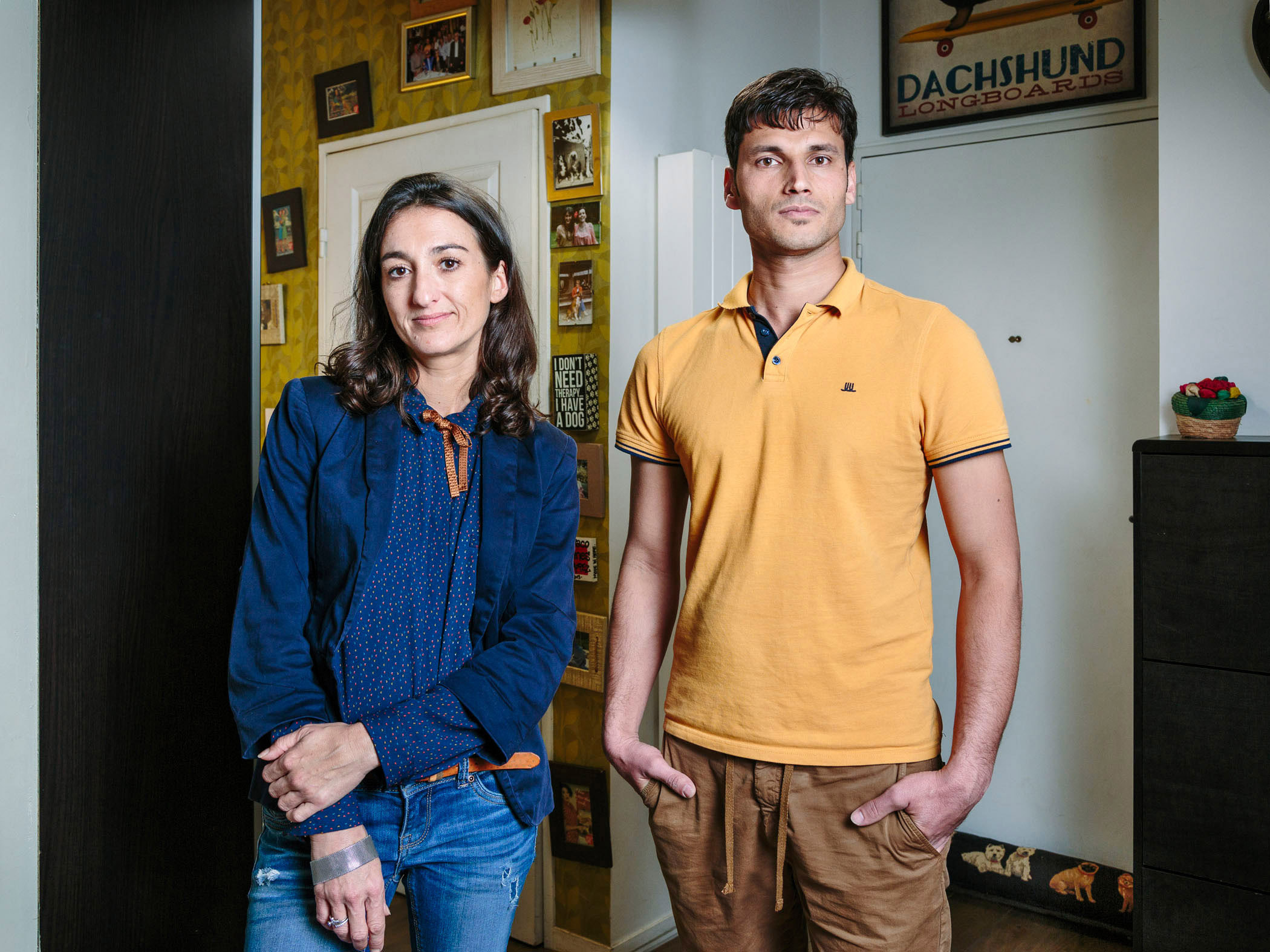
Afghanistan to France
Marion, a businesswoman, hosts Shir Bahadar, a 26-year-old refugee from Afghanistan, in her apartment in the suburbs of Paris. The house share has continued for almost a year and a strong bond has developed between the host and her guest.
Some time after Shir moved in, the Les Lilas household received news that turned their lives upside down: Shir Bahadar’s young brother Abdurrahman, whom everyone thought dead, traced his older brother via the internet. Abdurrahman (17) joined his brother in France, where he was taken into care by the child welfare services. Shir Bahadar says he is very happy to have his little brother with him in France, “and also my sister”, he adds, putting his hand on Marion’s shoulder.
“I had been going to the ‘Jungle’, a refugee camp near Calais, for a couple of months to help out. I did a bit of everything – peeling onions, handing out clothes, teaching French. One day, a member of one of the organizations asked me if I could give a young guy a lift to Paris for an appointment at OPFRA (the Office for the Protection of Refugees and Stateless Persons).” says Marion.
“I was just about to go back to Paris. Shir Bahadar came with me and stayed over at my place. Since I live alone and didn’t know him, I asked if someone from the organisation could stay, too. Shir Bahadar went to his appointment at the OPFRA and I could see he was nice guy, so I told him he could come back.
“They have done a great job. When he turned up, they took him in right away, otherwise I would have put him up, of course. He was given a place in a hostel but he comes over here often, about every other day. He is welcome to come whenever he wants.”
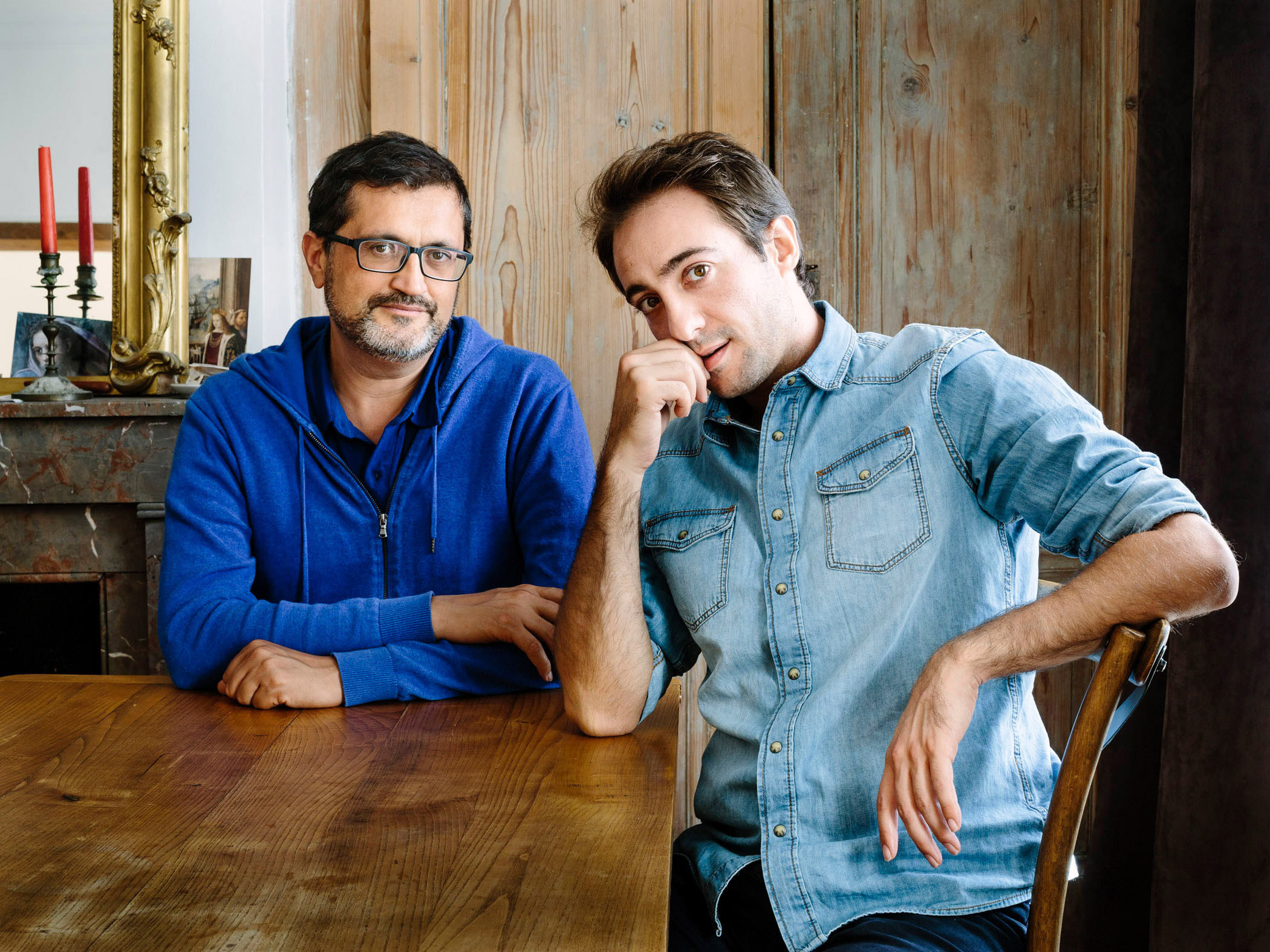
Syria to France
Lucien hosts Hussam (29), a Syrian refugee, in his apartment in Lyon, France. Then his friend took in a Syrian woman and her teenage son.
A few months later the family’s eldest son, Hussam, 29, arrived in France. But there was no room for him to stay with his mother and brother, so he slept in the tiny, unheated stock room of an organization for which he was volunteering, with four others.
“I was thinking of taking in a refugee, but frankly I had misgivings since I travel a lot for work and I’m not here all the time. I thought it would bother me to leave someone alone in my home” says Lucien.
“I put a lot into making them feel welcomed. We spent a lot of time together, we organized get-togethers and tea parties so they could meet people, try the food.” says Lucien.
“Hussam had accommodation problems, so I told him he could stay with me for a few days if he wanted, and he stayed on. At first, I didn’t see him very often because he was always busy.”
“A refugee’s life involves a lot of rushing around, from appointment to appointment, sorting out ID papers. It can take days at a time … And also, he had trouble settling down.”
“It was a while since he left home and he had travelled, moved around a lot, and when he arrived here he couldn’t stay in one place for more than a minute” remembers Lucien.
“When he slowed down a little, we began to enjoy our time together. Often, I would help him with his French in the morning and we would share meals together.”
“Broadly speaking, we are discovering a lot about our respective cultures. We all have our convictions, our prejudices, our ways of thinking, the defences we build around ourselves every day. When you have to deal with others, it shakes those defences up a little. In that sense, it’s really positive. We all need that.”
“Lucien has unlocked the door to French life for me. He has taught me lots of French words and explained their origin, which I find very interesting. He has also introduced me to the food” says Hussam.
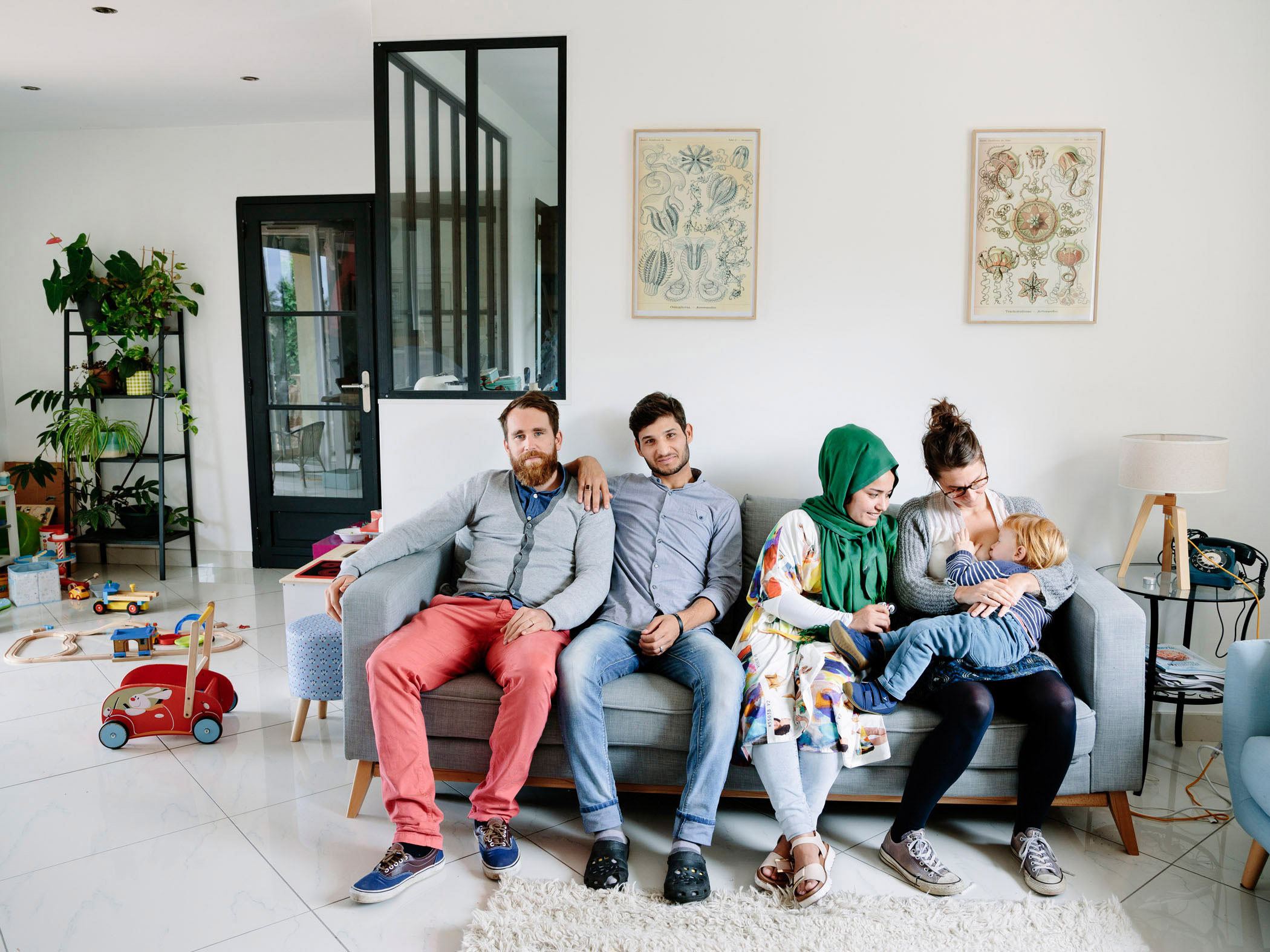
Afghanistan to France
Anaïs and Vincent, parents of Cesar (2), left Paris in 2016 to settle in the Lyon region. Their new life has allowed them to open their doors to an Afghan refugee couple, Zulfeqar (second from left) and Battarine.
Zulfeqar and Battarine fled Afghanistan, where their families had been persecuted by the Taliban. Once they had arrived at their destination, Zulfeqar and Battarine believed they were at the end of their ordeal but they were homeless and had to alternate for months between street life and emergency accommodation. The family's welcome has been a great relief for them.
“We walked all night long in the mountains. We were afraid of the police, then we crossed the border and stayed in Turkey for one month. In Izmir, we slept in the fields under the rain.
“Then we went to Greece, then Hungary and finally France” remembers Zulfeqar about their long journey. “Anais and Vincent are so nice to us. It’s going well.”
“In Paris, we felt somehow helpless, we wanted to do something, but our small flat didn’t allow us to host other people,” Anaïs and Vincent say. “When we came here, we had a spare room, so we thought it was a good opportunity to get started.”
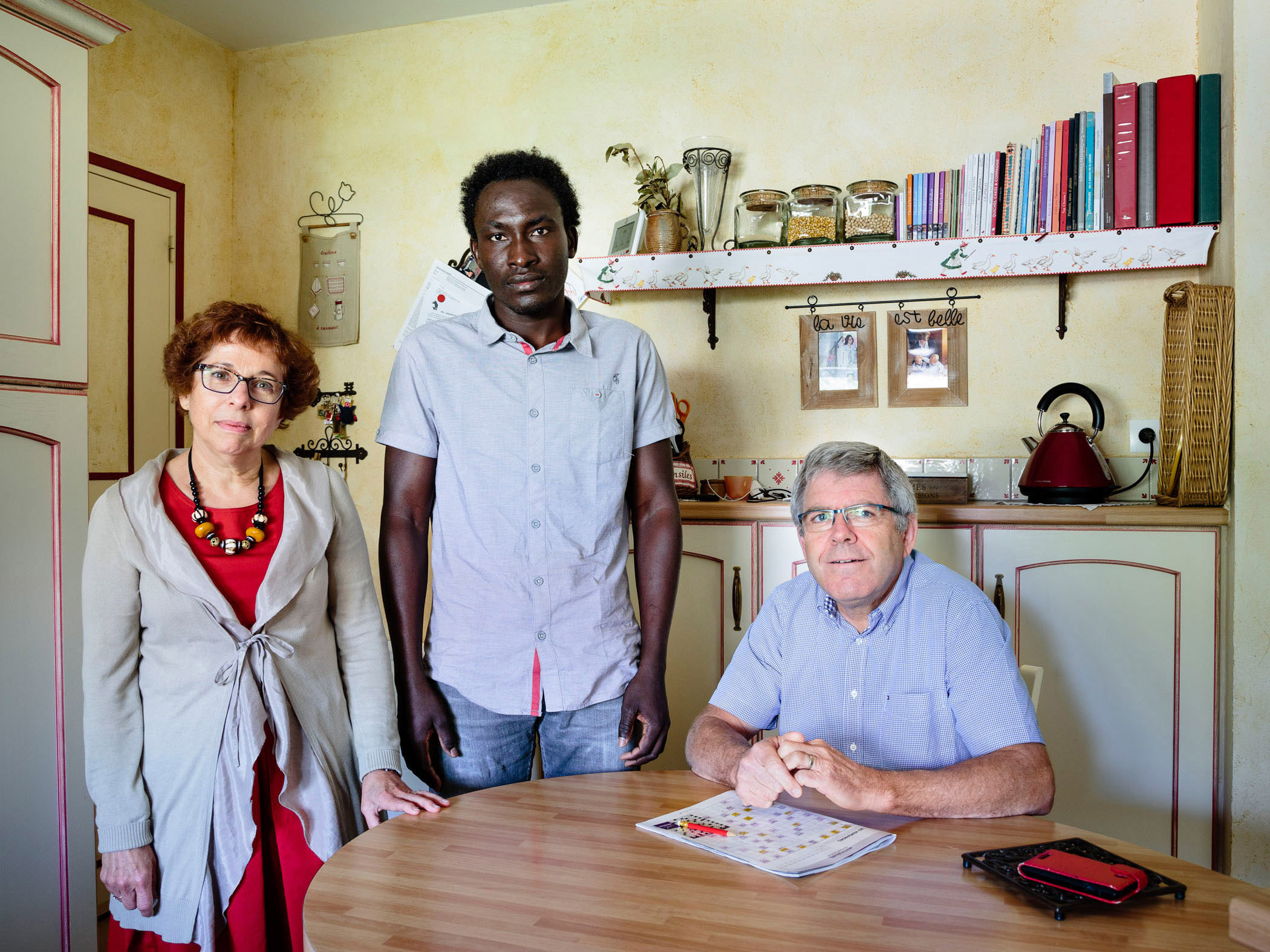
Sudan to France
Annick and Hubert were moved by their Christian values to take Farah, a 22 year old Sudanese refugee, into their home near Tours. They've found the experience overwhelmingly positive.
For Annick and Hubert, this show of solidarity goes hand in hand with their Christian faith. They play an active part in their local church but see no contradiction in putting up a practising Muslim.
“I lived in a village in Sudan when the Janjaweed (Darfur militia) arrived. They burned the whole village and killed many people” Farah recalls.
“I was held prisoner for 20 days then I managed to escape. I went into hiding for two months and afterwards, I decided to leave because I was scared that they would find me.
“The first day after I arrived [at the Verger’s], I wasn’t able to eat because the food was so different,” Farah remembers. “It was difficult to get used to!”
“As we see it, religion is following a particular belief, but also being open towards others,” says Annick.
“Welcoming someone who is a practising Muslim, someone who observes Ramadan, into our home is not a problem when we respect each other and each other’s beliefs. On the contrary, it is a wonderful and powerful experience. It is difficult to understand why so few people feel involved. We are very happy that we did it and met Farah. It is something we shall never forget.”
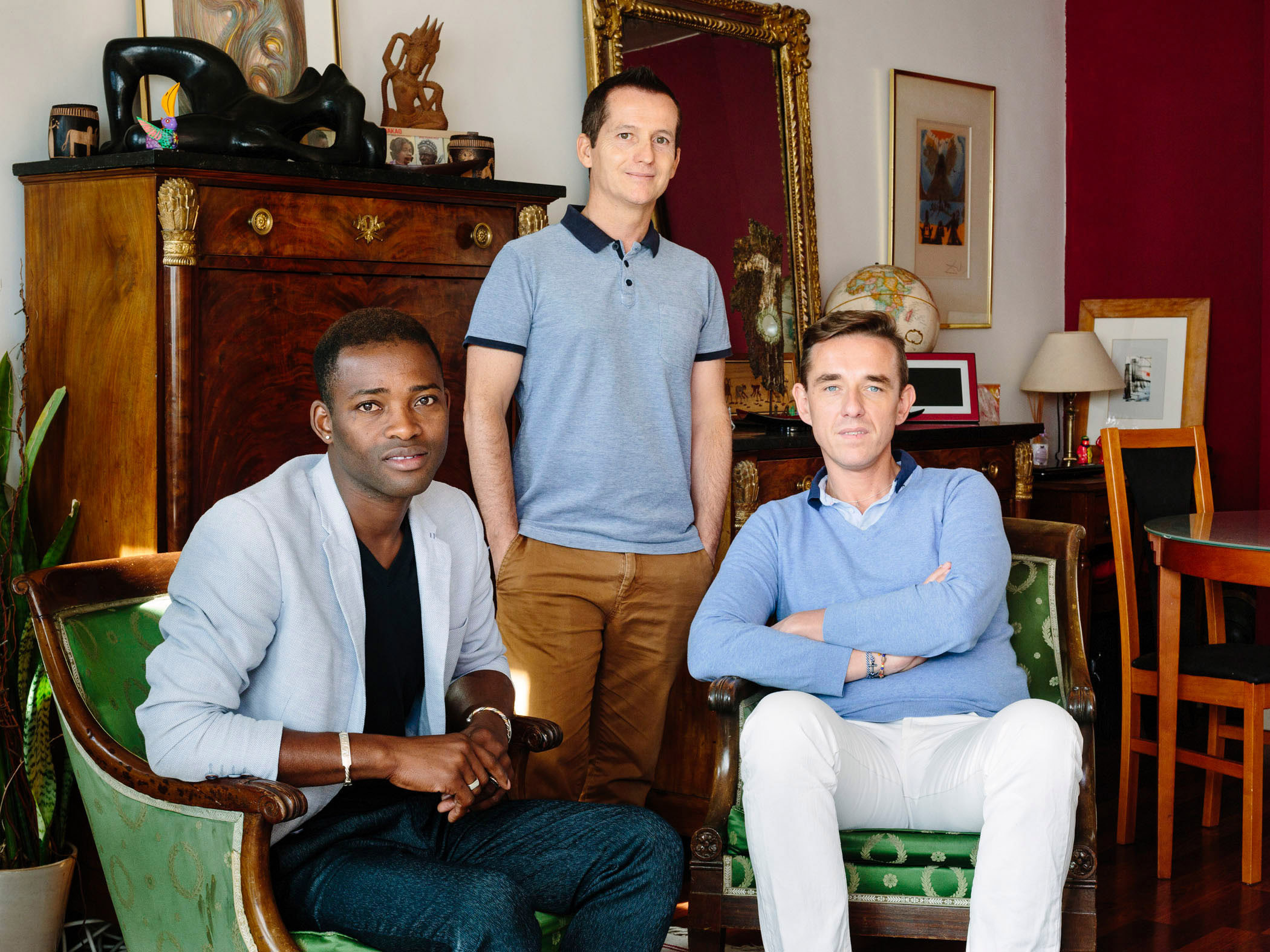
Mali to France
Louis (29) fled his native Mali without a backward glance to escape persecution for his sexuality and his activities in the LGBT community. In France, he found the moral support and understanding he needed with Armand and Christophe. Living with his new 'family' has made him enjoy life again.
One evening in Mali Louis received a whispered call from a neighbour warning him not to go home. According to him, there were some men waiting for him who had sworn to “kill the dirty faggot”. He never went home again, leaving without taking anything or telling his friends and family. After a long and hazardous journey, Louis reached Paris.
In 2015, Armand and Christophe had seen photos of Alan Kurdi, a toddler found drowned on a beach in Turkey. They felt moved to do something to help. They contacted the organization Réfugiés Bienvenue and offered to take in a refugee.
Right from the first meeting the three men got on well and Louis appeared to be a perfect fit for a successful flat share, which has been ongoing for over two years. The couple, who travel a lot, say they are open-minded and acutely aware of the rights and freedoms they enjoy in France compared to other parts of the world.
“I lost my mother when I was two and my father when I was 11. When I was 16, my grandmother died, so I was living alone in Bamako,” says Louis, smartly turned out in a blue suit.
“Since 2007 I had been working as a team leader for an anti-AIDS NGO. I gave talks on awareness-raising and prevention, focusing on gays and lesbians. I am happy again and feel at home,” says Louis about his new home in Paris.
“We have a nice life here and I reckon we are in a position, and have the means, to reach out to someone who was forced to flee his homeland because of war or persecution” says Armand.
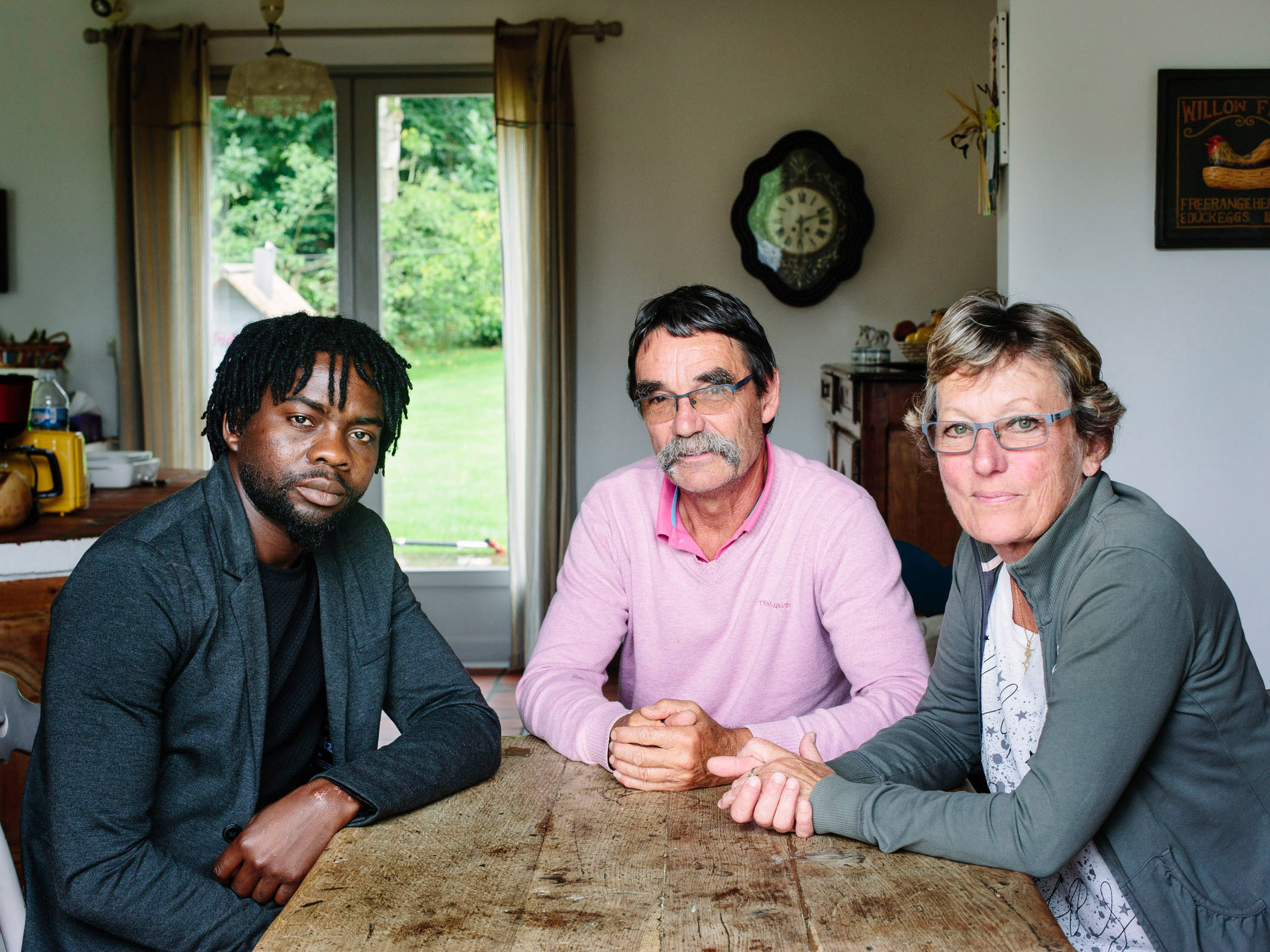
Sudan to France
Catherine and Jean-Pierre Pocheron are hosting Assadik, a young Sudanese refugee, at their home in Saint-Josse, northern France.
Assadik spent four or five months in the “Jungle”, the notorious makeshift camp for migrants and asylum-seekers, before the French Christian organization Secours Catholique, concerned about his psychological wellbeing, decided to intervene on his behalf. In Sudan, Assadik had worked on his parents’ farm until war forced him to flee the country.
“I travelled alone and it took me a year and a half to get from Sudan to France. I went through Chad, Libya, Italy, then France” Assadik remembers.
After all the hardships, the Pocherons’ simple and warm welcome was a great relief. “Here I have my own room. It’s nice and comfortable. Catherine and Jean-Pierre are very kind. It’s great for now, but I would like to move to the city later on, perhaps to Paris. I didn’t go to school in Sudan but here I would like to study and get a good job.”
“When he came to us, he had been depressed in the Jungle,” says Catherine. “The organisation asked us to put him up for a week, to give him time to recharge his batteries. He ended up staying for a year and a half!”
For Catherine and Jean-Pierre there was no question of letting him return to life on the moors around Calais. “It was horrific up there, so we decided to ask him if he wanted to stay. He agreed, and still agrees.
“We go with our feelings, our heart, so we didn’t ask questions, but at first our children were not keen. You hear so many things, so at the beginning we were careful,” says Catherine knowingly. “Now I wonder how I could be so wrong!”
